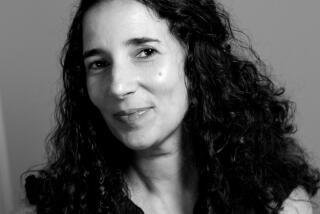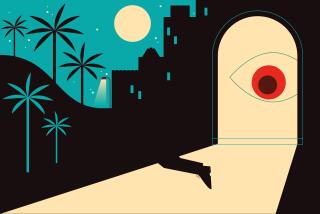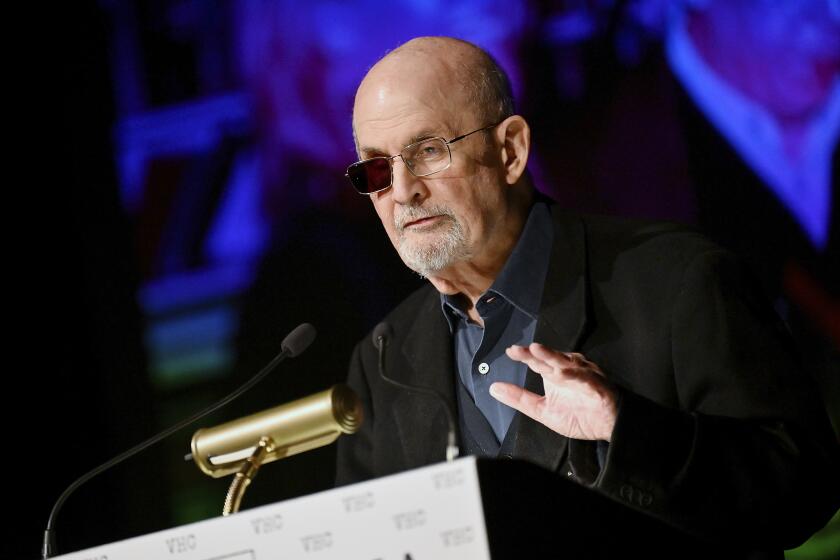Adam Sternbergh on the gleeful dystopia of ‘Shovel Ready’
Who knew that what was on the mind of Adam Sternbergh, the acute and witty observer of pop culture, was an assassin-for-hire in a forsaken New York? In his first novel, “Shovel Ready,” Sternbergh envisions a New York that’s largely emptied out after a dirty bomb hits Times Square. The rich have retreated into addictive virtual reality worlds, and our hero has no compunctions about cutting them off from their Internet and carotid arteries at once. The book begins when Spademan, a garbageman-turned-killer, is hired to knock off the fugitive daughter of a powerful televangelist, and speeds along in staccato, hard-boiled sentences. Sternbergh, whose book publishes today, answered our questions by e-mail.
“Shovel Ready” is set in a New York City that has been almost completely abandoned, full of empty streets and vacant buildings. While that might be depressing, it’s actually told gleefully. Do you have a secret desire to see the city destroyed?
Not at all! In fact, I currently work in Times Square, so the idea of a terrorist attack there (and there have been real-life attempts) is especially nerve-wracking. That said, when you work in Times Square -- or anywhere in Manhattan, really -- you’re always aware of what an incredibly popular tourists’ attraction New York has become -- which is amazing, given not that long ago it was a national symbol of lawlessness and urban decay. So in trying to imagine a sort of mirror-reverse of the current New York, the first question was: What would suddenly convince tourists to stay away? Ergo, a dirty bomb.
Plus, I definitely do have a nostalgia for the ‘70s version of New York -- not the real one (I never visited back then) but the one I’d see in movies like “The Warriors” and “Escape from New York” and “Death Wish” -- that kind of half-real, half-mythic lawless wonderland. Wouldn’t want to live there but definitely fun to imagine.
Your book pairs a dystopian New York with the usually-utopian Singularity. What was it like to bring those two things together?
I introduced the whole idea of a virtual-reality escape mostly because I was interested in what people in a bombed-out city would spend their time doing, since obviously they’re not going to Broadway or eating out at the latest gastropub. Plus, I was interested in juxtaposing the real, physical world of the city with an ethereal, virtual world -- then having a killer (someone very familiar with the fragility of physical human bodies) straddling in between. Even though the limnosphere in the book is presented somewhat dystopically, it’s actually a notion I’ve always been seduced by: That old idea of the holodeck from “Star Trek: The Next Generation,” a place where anything you can imagine becomes possible. Who wouldn’t want to get lost in that?
The book is told from the point of view of a hit man, which seems very Elmore Leonard-ish. Have you read him? What authors influenced you in writing this novel?
I have read a bit of Leonard, though not a ton. I’d say the Richard Stark “Parker” novels were much more in my mind when I started out -- along with, of course, Chandler, Hammett, James Cain and Lawrence Block -- who’s written great crime novels set in 1980s NYC, which in hindsight feels almost dystopian. I absolutely love all of Joan Didion’s 1960s-era non-fiction, plus “Play It As It Lays,” which is all hard-boiled in its own way, and also about a kind of bleak dystopia, as she was often writing about the dark underbelly of the California counter-culture. Another big and probably fairly obvious influence is Cormac McCarthy -- I really love the literary bleakness of his later novels, like “No Country for Old Men.”
Spademan’s weapon of choice is a box-cutter, which hearkens back to 9-11 and also means when he kills someone, the violence is intimate and bloody. Why not take the easy route and just give him a gun?
It came about mostly as a practical matter -- the first time we see him using a weapon in the book, he’s in a situation where he’s been searched and would have to have something on his person that he could have sneaked in -- so sniper rifles and chain saws were out of the question, and that’s when I gave him the box-cutter. But given the kind of physical world/virtual world juxtaposition I mentioned earlier, I definitely felt like it made sense for Spademan to use a weapon that is very intimate and physical. And I did think about the 9/11 resonance once I’d included it -- and how that event permanently transformed what we once thought of as a simple object -- a toolbox staple almost everyone has in their home -- into something much more ominous and dread-filled. Spademan is not a highly trained superkiller with a lot of high-tech equipment. He’s more of a hands-on guy.
As an editor in New York immersed in pop culture, why write a novel? Is the book not dead?
I’ll answer those questions in reverse order. First: No way! Every day I get on a crowded NYC subway for a 45-minute ride home to Brooklyn, having pretty much spent all day online, staring at screens and refreshing windows, and all I want is a floppy, pulpy paperback in my hand to get lost in. I’ve always been kind of a paperback fetishist, and if any kind of book survives long-term as, you know, actual physical books, I hope it’s that kind — the pulps. As for books/novels surviving as a form of storytelling, they’ve done pretty well over 500 years, so I’m not quite ready to write them off.
And as for being an editor immersed in pop culture: I think of this book as very much the product of the recombinant DNA of all the pop culture I’ve been immersed in for 25 years. Some of the stuff I love most feels like the product of two (or more) existing forms being expertly melded together: books like “Neuromancer” [by William Gibson], which so ingeniously took the traditional hard-boiled detective novel and rewired it was a brilliant and unsettling vision of the future.
There are a lot of religious elements in the book: Preachers good and bad, the lessons of the Bible, crossing the East River in a boat as if it’s Charon. What’s your own religious background?
That’s such a good question -- and I’m really glad you picked up on the fact that not all the religious characters in the book are bad or nefarious. Harrow, obviously, stands in the tradition of the malevolent preacher-man (I even literally namecheck “The Night of the Hunter” in the book) -- but Mark Ray, himself a former pastor, is still steeped in and strengthened by his faith (if conflicted about his own role in it) and Persephone too retains the parts of her faith that make her resilient. There are a ton of religious references and allusions packed in there -- for example, I’m not sure how many readers will pick up on the fact (and it’s fine either way, of course) that Pilot, the assassin who’s trailing Persephone, washes his hands after every murder -- which was inspired, of course, by Pontius Pilate, history’s most famous self-exonerating hand-washer.
As to my own background: While I am not a churchgoer in my adult life, I grew up in a very religious, and very loving, household in Canada, and spent my entire youth learning Bible stories, which obviously have lodged themselves in my brain. (And which, all else aside, are often great stories -- Shadrach, Meshach and Abednego is just a cool tale, for example.) And I’ve been surrounded my whole life by many religious people who are very loving and inspiring -- and, of course, many other religious people whose actions stand in stark contrast to their professed morals and beliefs. As a kid, I remember very vividly the saga of Jim and Tammy Bakker -- who live on for most people as a punch line, but whose fall was very traumatic to a lot of people of similar faith. Because here were these figures who seemed to be so committed to an apparently virtuous mission, and who were then unmasked as not only frauds, but actively harmful charlatans who fleeced good people out of money they then used to buy mansions and, infamously, an air-conditioned dog house. I mean, they were definitely comical, but there is something tragic and, to me, kind of horrifying about what they (and others) did -- and I’ve always been really interested in that tension, between truly believing in something (and someone) and then having all that ripped away, and what that leaves you with.
When you started “Shovel Ready,” did you know where it would end? Did you imagine writing a sequel?
I had a few ideas about what would happen in the story -- that Spademan would encounter a woman like Persephone, in her condition, and what that would mean for him -- but I did not know where it would all end up. About halfway through, though, I realized I was really intrigued by, and really enjoying, this world and these people -- so the idea of more stories involving both definitely seemed like a possibility. Thankfully, Crown agreed -- so I’m currently finishing up a draft of a sequel, which takes place about a year after “Shovel Ready.”
ALSO:
‘Words Will Break Cement’ documents the Pussy Riot revolution
Los Angeles libraries return on Sundays and more good library news
James Frey scores with book-movie deal; Google mysteriously involved
Carolyn Kellogg: Join me on Twitter, Facebook and Google+
More to Read
Sign up for our Book Club newsletter
Get the latest news, events and more from the Los Angeles Times Book Club, and help us get L.A. reading and talking.
You may occasionally receive promotional content from the Los Angeles Times.







